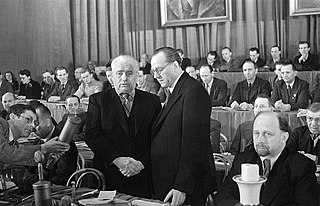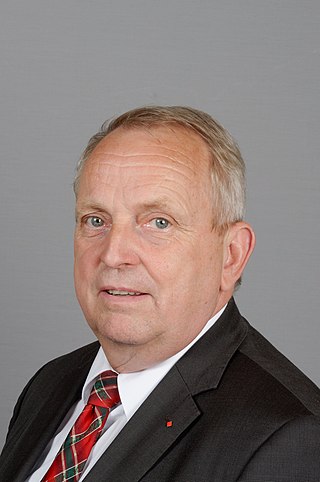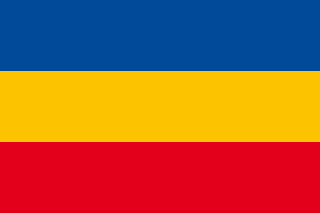
The Communist Party of Germany (KPD) and the east German branches of the Social Democratic Party of Germany (SPD) merged to form the Socialist Unity Party of Germany (SED) on 21 April 1946. Although nominally a merger of equals,the merged party quickly fell under Communist domination and developed along lines similar to other Communist Parties in what became the Eastern Bloc. The SED would be the only party of the German Democratic Republic until the end of the republic in December 1989. In the course of the merger,about 5,000 Social Democrats who opposed it were detained and sent to labour camps and jails.

Karl Otto Hamann was a German politician. Between 1948 and 1952 he was chairman of the Liberal Democratic Party of (East) Germany (LDPD) and also the German Democratic Republic's Minister for Trade and Supply.
Robert Neddermeyer was a German political activist and Communist politician.

Till Backhaus is a German politician. As the German Democratic Republic approached its end as a standalone state,Backhaus was one of those who in December 1989 (re-)founded the Social Democratic Party,more than four decades after its suppression.
Gustav Siemon was a German politician. At a national level he was a member of the East German National legislature (Volkskammer). Regionally,he led the National Democratic Party (NPDP) in Mecklenburg.
Hugo Wenzel was a German politician. He became a Communist Party activist and,from 1921,a member of the Regional Legislature for Mecklenburg-Schwerin. When he died he was an inmate at the Sachsenhausen concentration camp.
Otto Körting was a German politician.
Herta Geffke was a German activist and politician who resisted Nazism. After 1945 she became a member of the Central Party Control Commission of the SED in the Soviet occupation zone,identified as a "true Stalinist" and feared on account of her interrogation methods.

The State of Mecklenburg was a subdivision of the Soviet occupation zone and one of the states of East Germany which corresponds widely to the present-day German state Mecklenburg-Vorpommern. The state was originally formed as an administrative division,the State of Mecklenburg-Vorpommern,by the Soviet Military Administration in Germany (SMAD) in July 1945. It consisted of the 1934-established Mecklenburg and parts of the former Prussian provinces of Pommern and Hanover. The city of Swinemünde was handed over to Poland in October 1945,becoming part of Szczecin Voivodeship. In November 1945,a transfer of small territories along the Inner German border to the former Province of Schleswig-Holstein was carried out as part of the Barber–Lyashchenko Agreement. About 2.1 million people were estimated to live in Mecklenburg in 1946. From 1947,the term Vorpommern was excluded from the official name as the SMAD feared that this would support revisionist actions against formerly German parts of Poland. Compared to the administrative divisions of Nazi Germany,Mecklenburg comprised the Gaue Mecklenburg and parts of Pomerania and Eastern Hanover.

Helmut Lehmann was a German politician (SPD/SED).
Lydia Poser was a German politician of the KPD and SED and widow of the executed Communist official Magnus Poser.

Frieder Lippmann was a German politician (SPD). He was a member of the East German national parliament (Volkstag) and of the regional parliament (Landtag) of Thuringia.
Willy Sägebrecht was a political activist and politician from the Communist Party of Germany who was incarcerated as a resistance activist during the Nazi period. After 1945 he became a member of East Germany's powerful Party Central Committee and then,in 1957,head of the country's Military Intelligence Service.
Max Silbermann was a German politician. He served as a member of the Saxon regional parliament ("Landtag") between 1931 and 1933.
Arnold Gohr was a German clerical worker who became a trade unionist and activist. After 1945 he entered mainstream politics in East Berlin. As the Soviet occupation zone evolved into a Soviet sponsored one-party dictatorship,he never joined the ruling party,remaining instead a leading "collaborationist" member of the eastern version of the Christian Democratic Union. He became a party chairman and served between 1948 and 1958 as "deputy lord mayor" of Berlin,a period during which the increasingly divided city's constitutional status and future were contentious and ambiguous on a number of different levels.

State elections were held in the Soviet occupation zone of Germany on 20 October 1946 to elect the state legislatures of Mecklenburg-Vorpommern,Brandenburg,Saxony,Saxony-Anhalt and Thuringia. They were the only elections held in the future territory of East Germany before the establishment of the German Democratic Republic in 1949,and the only free and fair elections in that part of Germany between 1932 and the Peaceful Revolution.

Katharina "Käthe" Kern became a German anti-government activist during the Hitler years. After 1945 she quickly emerged as a senior politician and party loyalist in the Soviet occupation zone. She served between 1946 and 1985 as a member of what became the powerful Party Central Committee. A long-standing leading figure in the Ministry for the Health Service),she also served,between 1949 and 1970,as head of the national "Mother and Child department".







